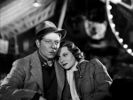Eye For Film >> Movies >> Port of Shadows (1938) Film Review
One of the best examples of the “poetic realism” of pre-War French cinema, Le Quai des Brumes is also a bittersweet cinematic tribute to a, perhaps, typically French set of values: freedom, liberty and the desires of the heart.
That said, Le Quai des Brumes is not a sentimental film. It’s tough and world-weary. The fatalism is all encompassing, quite literally in the form of the dense fog which enshrouds the port city of Le Havre in which the action is set. The fog isn’t restricted to the streets, mind. As Jean (Jean Gabin) - a deserting soldier on the run - responds to the lorry driver who tells him there’s no fog in Tonkin (A French colony in Vietnam): “Yes there is. In here”. He bats an indignant finger against his forehead and stares in a way which suggests you don’t want to dispute the weather with him.

This comes at the start of the film, and is quickly followed by Gabin delivering a wonderful speech on what it feels like to shoot a man in the belly. A cigarette dangles from his lips, his head cocked to the side, the camera tracking in. You get the impression that getting shot in the belly is unpleasant. Perhaps Jean should bear that in mind.
Gabin is often spoken of as the French Bogart. More like Bogart was the American Gabin, given that Gabin was an established star well before Bogie was. Both have an easy physicality and a careful way with words, which finds women weak at the knees and men practising tough stares in the mirror. Gabin’s performance in this is nothing short of a tour-de-force. He’s magnetic: intimidating and likeable all at once.
After walking out of the fog into a desolate little dive called Panama’s, Gabin first encounters Nelly (Michele Morgan). A silent stare between the two of them, which seems to encapsulate both fear and excitement, reminds us that this film noir territory and Nelly’s more than likely bad news for Jean’s health. He tries to chat her up in his own odd, inimitable way. He insults and compliments her in the same sentence, all the while chomping on a slab of stale bread and slicing up bits of sausage for a stray dog he’s taken an unwilling liking to by his side.
Nelly’s got problems though. She’s involved in a rather obscure feud over an ex-beau named Maurice between her godfather Zabel (Michel Simon) – a truly repugnant troll of a bad guy, with a beard to match – and a local gangster, the snivelling and cowardly Lucien (Pierre Brasseur). Jean has no time for the nonsense of these two and Lucien quickly receives the staple rebuke of a noir protagonist - a quick-fire double slap across the cheeks. Zabel fairs no better, with Jean throwing him around his elegant dining-room for trying to bribe him.
While the film’s fatalism and melancholy aspects are clearly evident, director Marcel Carne and writer Jacques Prevet manage to slip in quiet moments of redeeming humanism. Whether that’s Jean cutting up the aforementioned sausage and offering it to the dog before him; or artist Michel giving up his life and possessions for a stranger he’s just met; or even Nelly slipping Jean a couple of francs because she knows he’s hungry and too proud to ask for help; the kindness of strangers in this foreboding and foggy world of gangsters and crooks reveals an aspirational and tender heart underneath it all.
It’s not just Gabin and the hypnotic Morgan who make this doomed tale of romance compelling viewing. Jacques Prevet’s script is full of brilliant dialogue, which can be funny, mean and tragic all in the same scene. Maurice Jaubert’s score is dark and tempestuous, while the work of production designer Alexandre Trauner and cinematographer Eugen Schufftan displays what “poetic realism” should entail in a visual sense. The port is grimy; the narrow, cobble-stoned streets give rise to hulking ships spewing black filth into the air in the background. Yet amidst all that, Gabin and Morgan wander around beautifully lit as if physically – if not psychologically – untouched by their surroundings.
A precursor to the American Noir of the 1940s, Le Quai des Brumes remains a powerful example to disprove the theory that French cinema had little of value before New Wave dissidents like Jean-Luc Godard and Francois Truffaut declared the old ways dead. While Jean-Pierre Melville may have kept fatalistic noirs and policiers alive throughout the reign of the New Wave rebels, Le Quai des Brumes has stood the test of time with the best of them.
Reviewed on: 10 Sep 2012
















